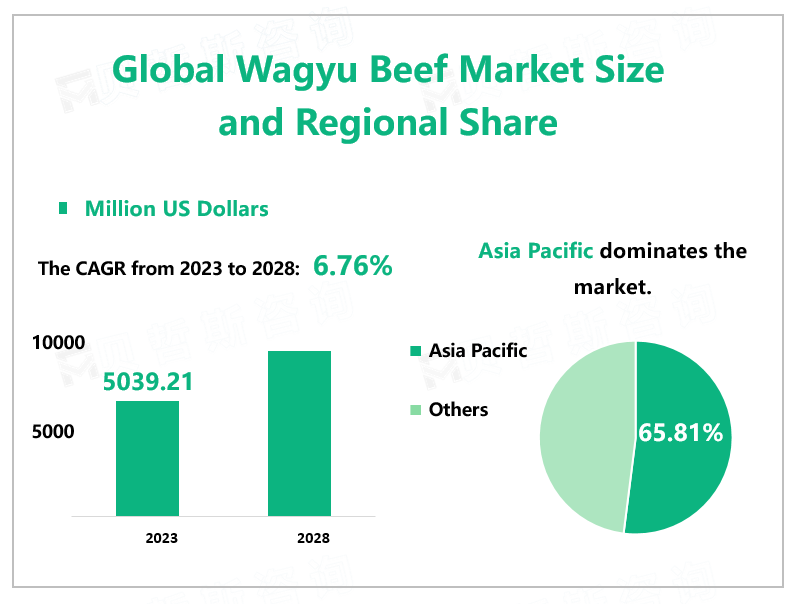Global Wagyu Beef Market Overview
According to Global Market Monitor, the global Wagyu beef market size was $5039.21 million in 2023 with a CAGR of 6.76% from 2023 to 2028.
In the beginning, the Wagyu beef market was mainly traded through offline restaurants, supermarkets, and various food stores. With the development of e-commerce in various places and the introduction of Wagyu breeds in some countries, local buyers can not only purchase locally but also order online. Therefore, with the development of the market, the trading methods of Wagyu beef are also undergoing earth-shaking changes.
Asia Pacific Dominates the Market.
In 2022, the share of the Wagyu Beef market in Asia Pacific stood at 65.81%. The December 2022 edition of Meat Management highlighted the changing pattern of global beef imports. 2021 saw over 60% of imports sent to Asia with China being the major destination. Japan is one of the largest producers of Wagyu in the world and has designated beef as its national treasure. Hence, to maintain its exclusivity, the country has banned the export of live animals from Japan to other countries. Moreover, the country has also established stringent policies and guidelines that help to ensure the quality of products. Changes in dietary habits in the Asia Pacific have positively influenced the demand for animal protein, especially beef.
North America is the Second-largest Market.
North America is the second-largest market. This is attributed to the increasing consumption and adoption of Wagyu beef products among upper and middle-class families in North America. Technological breakthroughs, clever marketing, and rising consumer knowledge of the benefits of eating Wagyu beef are some of the primary reasons driving the regional market. The widespread consumption of Wagyu beef in North America, particularly in the United States, contributes to the market's overall expansion.

Healthy Benefits of Wagyu Beef
Wagyu beef is rich in fatty acids such as conjugated linoleic acid (CLA), which makes it tenderer and more flavorful than other types of beef. It also has better flavor and a lower melting point than ordinary beef fat. In addition, Wagyu beef contains oleic acid, which is considered to be good for the heart, and has the lowest cholesterol level compared to other red meat, fish, and chicken. Therefore, for those who want to work out and change their lifestyle, Wagyu is a better beef choice. As a result, awareness of the various health benefits of Wagyu beef will drive demand growth over the forecast period.
Wagyu Beef Breeding Costs are High.
Raising Wagyu beef cattle is very strict with feed and quality control, and each Wagyu beef has a birth certificate to prove its pedigree. From birth, Wagyu beef cattle are raised on milk, grass, and protein-containing feed. Some ranches will also hire someone to massage and drink beer for the cattle to make the meat more tender. Even on Australian farms, it is being raised with high-quality red wine. In this respect, the consumption of breeding cost increases the cost of the whole Wagyu beef by a large margin, which is not so friendly to consumers and is not conducive to the development of the broad consumer market. At the same time, high breeding costs will put pressure on producers.
|
Drivers |
Increasing Disposable Income |
|
Changes in Consumers’ Eating Habits |
|
|
Healthy Benefits of Wagyu Beef |
|
|
Rising Demand for Animal Protein among Health Conscious |
|
|
Increased Trade Activities among Countries |
|
|
Challenges |
The producing area is limited. |
|
Wagyu breeding costs are high. |
|
|
Strict Regulatory Policies Related to Wagyu Cattle Breeding |
We provide more professional and intelligent market reports to complement your business decisions.